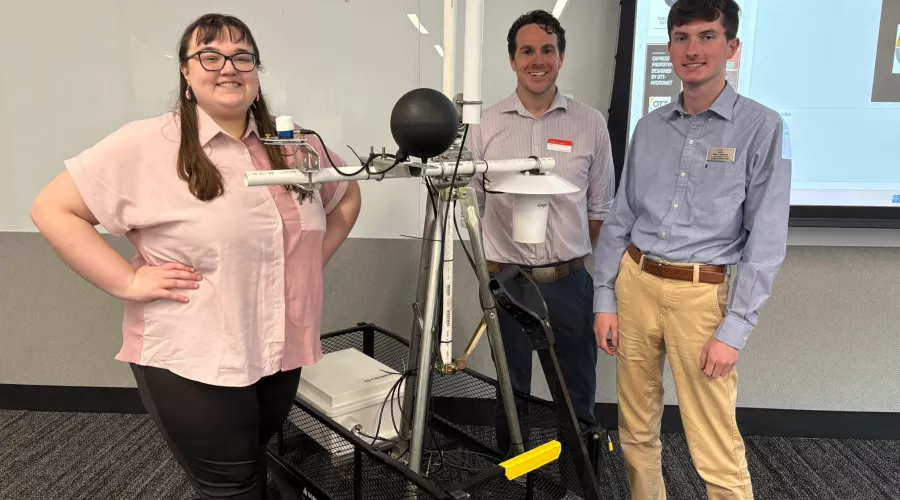Chasing Storms, Building Solutions: UofL Student Crafts Mobile Weather Cart to Address Urban Heat
October 1, 2025
By Stephanie Godward, Communications and Marketing Director, College of Arts & Sciences
Katherine Drechsel has never been afraid of storms.
In fact, she’s fascinated by them and always takes a closer look.
This summer, she put her passion for meteorology into action as part of the Summer Research Opportunity Program (SROP), building a mobile weather cart with her own hands.
“I've always loved physics; meteorology is applied physics, and I've always loved weather,” Drechsel said. “I used to watch the show ‘Storm Chasers’ as a kid, and I used to like it if there was a storm outside and the sky turned green. My sister would be freaking out, and it was kind of funny, because I'd be at the window, like I need to see what's going on. Storms never scared me, and they still don't. If there's a storm approaching, I want to see it.”
Pursuing an Applied Geography BS on the meteorology track, Drechsel is a 27-year-old nontraditional student who works full-time night shifts and attends classes during the day part-time.
“It will take me a little bit longer to get my degree, but at least I have good grades,” she said.
Drechsel’s mobile weather cart project all began with a question she posed to her mentor and assistant professor in the Department of Geographic and Environmental Sciences, Scott Gunter. How do you build precipitation instrumentation?
Drechsel explained that in meteorology classes, you mostly learn math and science theory, but not the hands-on skills needed to work with radars, satellites, or weather instruments. The SROP gave her the chance to get out in the world and put classroom knowledge into action.
“You think of science as people with clipboards and everything goes right all the time. But really science is like, ‘Let's make this thing less wobbly by putting zip ties on it and hopefully that works,’” Drechsel said. “I really like solving problems and that's what I liked about building the cart and doing the field work."
The cart, named LOUHE for Louisville Heat Explorer, measures wet bulb globe temperature, which measures how humans actually feel outside in the heat, and is used to assess heat risks in the military and OSHA. Drechsel and Gunter’s data is informing the work being done by the University of Louisville and its partners to develop LOUMED Commons, a new, shaded public park at 316 E. Chestnut Street in the heart of Louisville’s Medical and Education District.
Expected to open its first phase by late 2025, the park will feature shaded seating, a tree canopy, native plantings, food truck space, and flexible event areas—creating a much-needed place of relief from heat and a place for connection for healthcare workers, students, patients, and visitors.
“I learned how to put instruments together; we had a GPS unit, and we had an aspirated thermometer,” Drechsel said. “It measures incoming solar radiation, and we had a sonic anemometer, all this kind of stuff used to measure the conditions outside. We took the cart up and down East Chestnut Street weekly, and we're still in the process of doing it.”
Backed by $11.75 million in city and state funding, the LOUMED project aims to support the well-being of more than 18,000 healthcare professionals, 10,000 students, and 1.5 million annual visitors to the district.
"It will be a park where people can sit down in the shade and find some relief because I can definitely tell you as someone who's passed out or almost passed out multiple times due to heat, I'm taking heat measurements that are sorely needed,” Drechsel said.
The SROP experience broadened Drechsel’s career goals in meteorology, showing her options beyond forecasting, such as working as a radar technician, on satellites, or collecting field data. She discovered she enjoys hands-on work, learned extensively, and gained valuable academic and professional experience through the program.
“I learned how to cut pipes, how to solder, and I learned how to use tools. I didn't work on cars with my dad or anything, so I had to learn. And now I feel so empowered,” Drechsel said. “SROP is a great way to try something hands-on in your field. Because where else are you going to get that kind of experience as an undergrad?”
Related News



